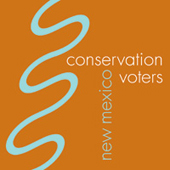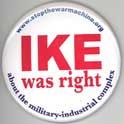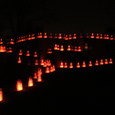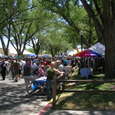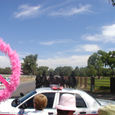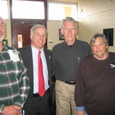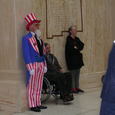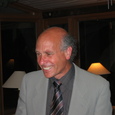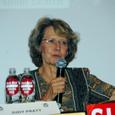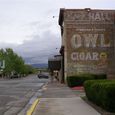« NM-01: Come to Martin Heinrich's Victory Party This Thursday | Main | Join AFL-CIO, Working Families in ABQ Today to Protest Gas Prices and Giveaways to Big Oil »
Tuesday, June 10, 2008
Bernalillo County Clerk Gets EAC Grant for Mock Election
Congratulations to Maggie Toulouse Oliver and all the folks at the Bernalillo County Clerk's office. The U.S. Election Assistance Commission (EAC) will award an average of $20,000 each to 10 organizations from nine states that educate secondary school students and their parents about the electoral process through staged national elections. The Bernalillo County Clerk’s Office was awarded $20,091 under the program.
Bernalillo County has more than 620,000 residents in 424 precincts and serves large minority populations consisting of Hispanic/Latin American and Native American citizens. The Bernalillo County Clerk’s Office has titled their program, “Go Vote!,” and they will target senior level students enrolled in four high schools serving largely minority precincts. Their mock election will feature real candidates and ballot issues that will mirror the real ballot and the election process that voters will experience in November. The goal of the program is to have 90% or better of the targeted high school students participate in the mock election program.
The U.S. Election Assistance Commission will also award $750,000 to 27 colleges and nonprofit organizations from 18 states to recruit students to serve as poll workers during the November presidential election. The EAC estimates roughly 8,800 college students will become poll workers as a result of the grants, known as the Help America Vote College Program.
The full list of grant recipients is available on the EAC website.
“These grant programs will help not only recruit more poll workers for November, but also recruit the next generation of poll workers by focusing on recruiting and educating younger Americans about the importance of civic participation on Election Day.”
Through the Help America Vote College Program, the EAC distributes funds to increase the pool of qualified poll workers. The program also seeks to ease poll worker shortages such as those seen in the 2004 election, where 5.8 percent of polling places and 4 percent of precincts reported having too few poll workers, according to the EAC Election Day Survey.
This is the program’s third year — in 2004 and 2006, its grantees brought in more than 5,000 students to serve as poll workers. Poll workers are critical to running smooth elections—they set up and take down polling place materials and equipment, check voters’ registration, and demonstrate how to use voting systems.
In addition to administering the Help America Vote College Program, the EAC also provides information about poll worker requirements in each state, and issues guidebooks and information to local election officials on poll worker recruitment and training.
Getting younger students interested in voting is another goal of the grant programs. The Mock Election Program is designed to instill in younger students an interest in the election process by allowing them to participate in a simulated election with voting equipment, ballots and poll workers.
Winners of both programs were selected through an independent review process that examined each applicant’s level of experience and their management and conceptual approaches for meeting program goals.
The EAC is an independent bipartisan commission created by the Help America Vote Act. The EAC serves as a national clearinghouse and resource of information regarding election administration. It is charged with administering payments to states and developing guidance to meet HAVA requirements, adopting voluntary voting system guidelines, and accrediting voting system test laboratories and certifying voting equipment. It is also charged with developing and maintaining a national mail voter registration form. The four EAC commissioners are Rosemary Rodriguez, chair; Caroline Hunter, vice chair; Gracia Hillman; and Donetta Davidson.
Technorati Tags:
June 10, 2008 at 06:32 PM in Election Reform & Voting | Permalink




















